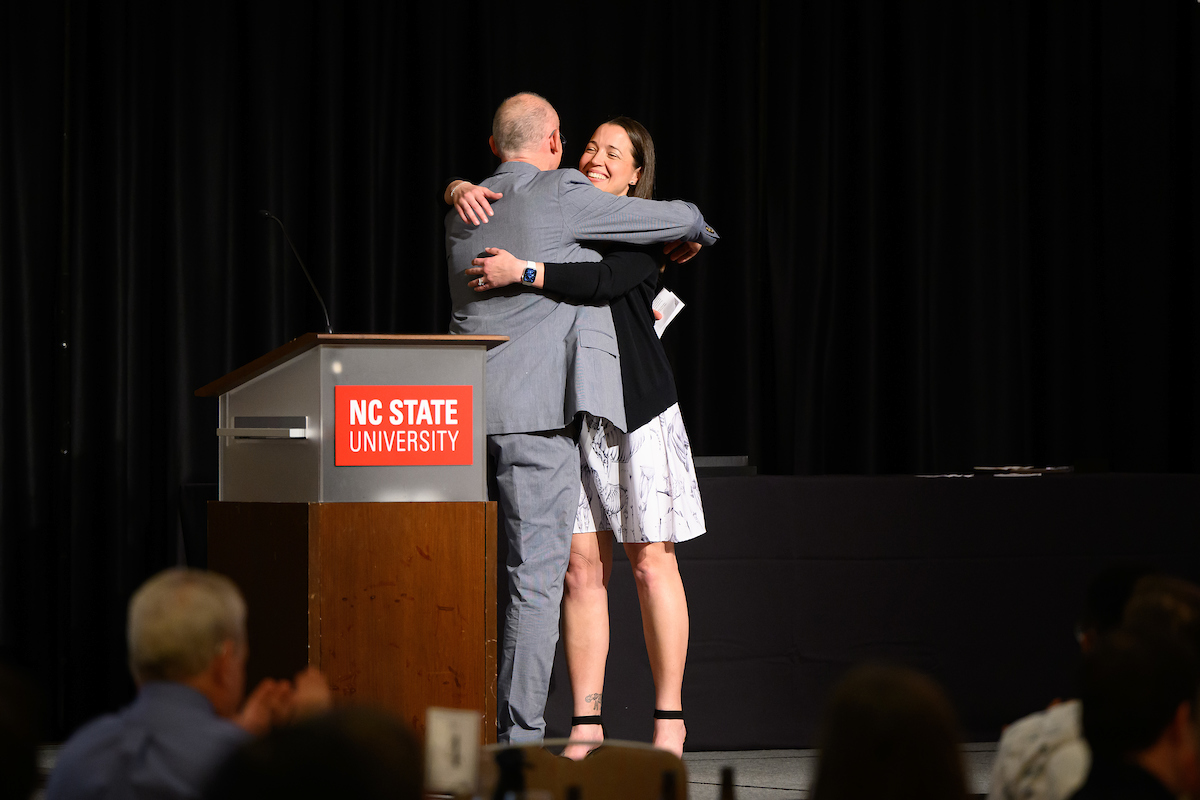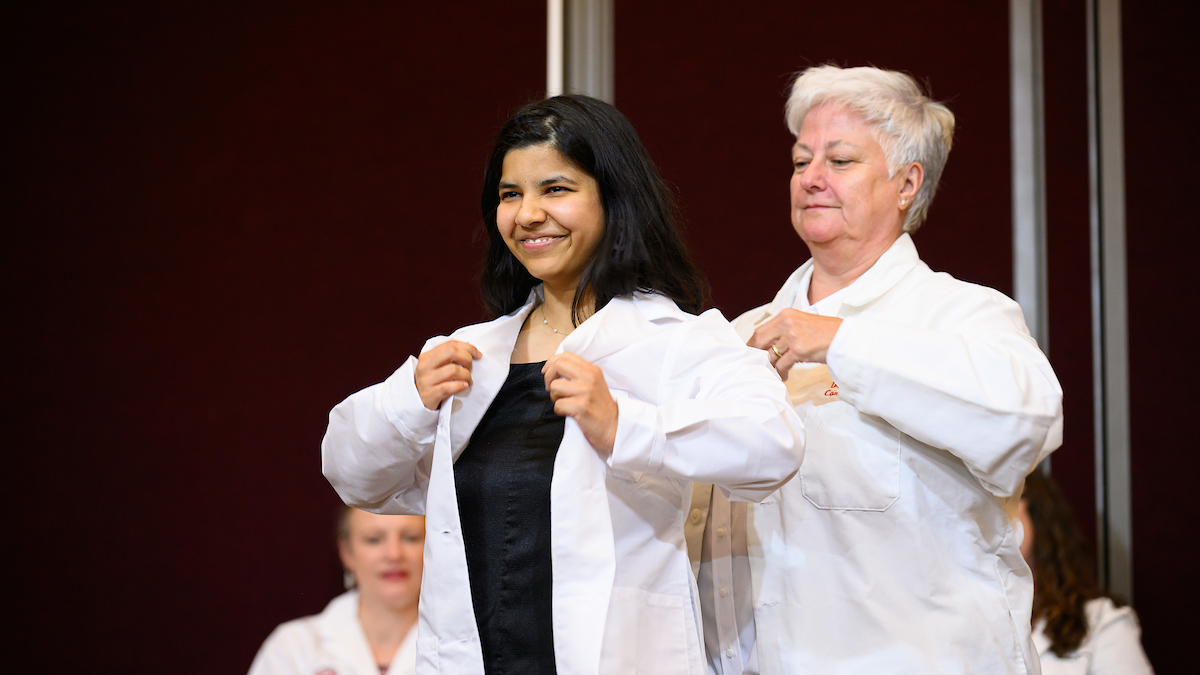A Heartfelt Gift for Saving Tuc
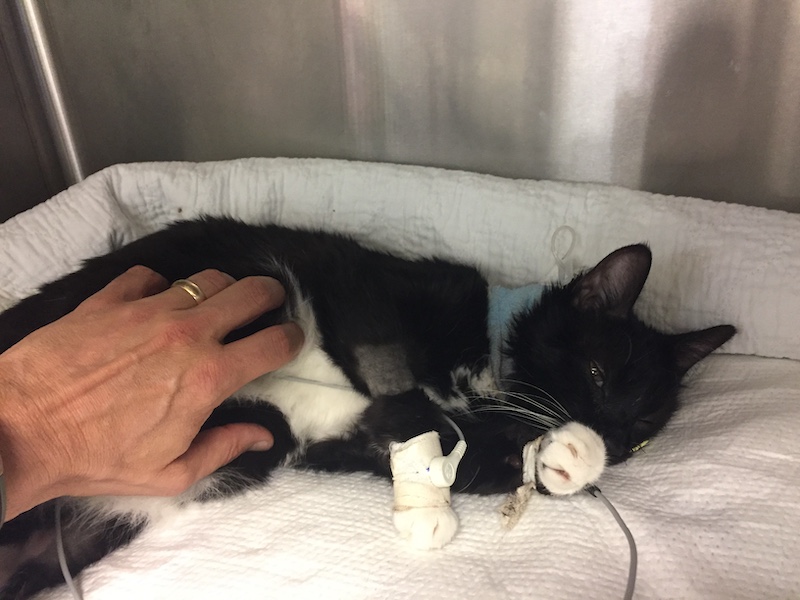
On a crisp October day in 2007, Liz Parrish Elwell of Richmond decided to go for a hike in the mountains of Virginia. During her trek she happened upon a tiny black animal with just one eye open. It made its way toward her.
“At first I thought it was a baby skunk,” says Elwell. “Then I thought, ‘Oh, gosh, it’s a kitten.’”
As the kitten struggled forward, Elwell searched for his mother. Seeing none, and with darkness approaching, she made a decision. She was not leaving him there.
She scooped up the little guy and tucked him into her sweater. She drove the two hours back home with the kitten safe and warm beside her. And just like that, Tuc got a name and a forever home.
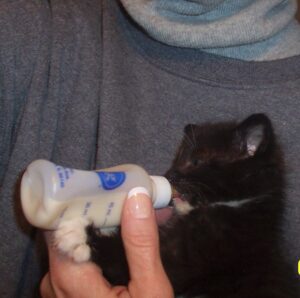
Tuc would later be saved a second time, thanks to the determination of his owners and the clinicians at the NC State Veterinary Hospital who would later treat him for a life-threatening heart condition. In turn, Elwell’s gratitude led to opportunities for other cat owners to save their beloved companions, too.
Liz Elwell and her husband, Dennis, have established the Tuc Elwell Client Assistance Fund in Cardiology with a $10,000 gift to the North Carolina Veterinary Medical Foundation.
The fund provides critical financial assistance to the owners of cats who are suffering from cardiac conditions who lack the means to afford the necessary treatment for their beloved companions.
“I hate to think of someone else in the position we were in having to decide what to do based on the cost,” says Dennis Elwell.
Liz Elwell believes Tuc was about 2 weeks old when she brought him home. At first she had to feed him with a bottle. The bonding seems to have had a major influence on Tuc’s development.
“People often say he acts more human than any cat they’ve ever known,” she says.
Tuc even hugs the people he loves,
He gained a new admirer in 2012 when Liz met Dennis Elwell. Dennis Elwell says that he wasn’t a cat person before he met Tuc, but there was just something different about how the little black cat shared his affections with people.
“I thought, this cat is like a human,” he says. “I had been around cats all my life, but Tuc is just special.”
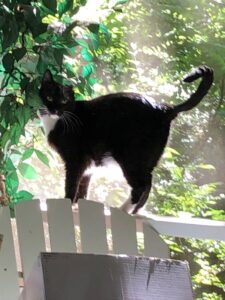
In June 2019 Tuc was suddenly stricken with a deadly feline condition comparable to deep vein thrombosis in humans. A clot was causing saddle thrombosis, blocking the blood flow where the main arteries branch off into both legs. Tuc was unable to walk and in great pain.
“We heard a cry and he fell,” Liz Elwell says. “He has never cried a lot, but he was wailing.”
The initial news was devastating, and the recommendation was euthanasia. Tuc was also experiencing heart failure, and there were no cardiologists at the Elwells’ local veterinary clinic. But they were not prepared to give up so soon on their cherished friend.
Tuc was given a blood thinner and he was referred the NC State Veterinary Hospital, normally about a three-hour drive from Richmond. When they left for Raleigh, the area between the two cities was drenched in torrential rain.
Nevertheless, the Elwells navigated through the downpour, averaging no more than 25 miles per hour. It took them five hours to reach NC State. By the time they arrived, Tuc was still alive, but struggling to breathe.
Waiting for them was a team of cardiac specialists and skilled technicians that swiftly sprang into action. Tuc received oxygen and medications to help his heart and dissolve the blood clot.
Cardiology resident Anna McManamey spoke calmly and straightforwardly with the Elwells, explaining the situation and the planned treatment. She made it clear that Tuc faced an uphill battle, but she gave the Elwells something they desperately needed — hope.
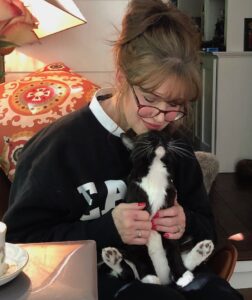
After a week of round-the-clock cardiac care and three daily visits by the Elwells, Tuc slowly began slowly to improve.
On the day Tuc began to eat again, the Elwells wept.
Although his hind legs were paralyzed there was significant improvement, and Tuc was cleared to return home. In time he regained the use of his hind legs. The Elwells continue to give thanks to McManamey and the entire medical team responsible for Tuc’s survival.
And thanks to the Elwells’ generosity, more pet owners will be able to take advantage of the advanced medical care available at NC State.
“The doctors and clinicians were amazingly compassionate, responsive and attentive to Tuc throughout his time there,” the Elwells said via email. “To make matters even better, the professionals from NC State took time and special care for us, the nervous parents.
“Words cannot adequately capture the insights, collaboration and extraordinary lengths that NC State took to save and rehabilitate Tuc.”
And the Elwells remain forever grateful that Tuc came into their lives.
“He is and ever will be our sweetest special angel,” they said.
~Steve Volstad/NC State Veterinary Medicine
To give to to the NC State College of Veterinary Medicine and the NC State Veterinary Hospital, go to give.ncsu.edu/vetmed.
- Categories:
